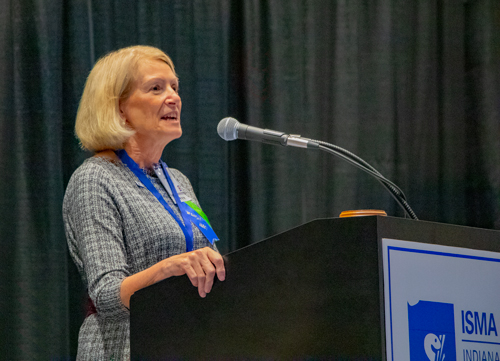Lisa Hatcher, MD, was sworn in as ISMA’s 170th president at the 2019 convention. She is a family medicine and obstetrics practitioner with Parkview Health in Columbia City, where she is also a longtime resident.
In her acceptance speech at the Sunday morning House of Delegates meeting, Dr. Hatcher emphasized the importance of creating a strong community of physicians. She noted the many opportunities during convention weekend for physicians at all stages of their careers to share opinions and ideas and choose a course of action, even though their opinions differ.
“We’re having conversations. We’re making connections,” she said. “That’s building a community. We are a community of colleagues who are dedicated to our patients and each other and to our nation and its public health.”
Dr. Hatcher graduated from Manchester College (now Manchester University) in North Manchester, Ind., and earned her medical degree at IU School of Medicine. Before becoming a physician, she worked as a nurse and a hospital administrator, as well as a high school teacher and basketball coach. She also earned an associate degree in nursing from Purdue, a master’s degree from St. Francis University and a Master of Business Administration from Indiana Wesleyan University.
Previously, Dr. Hatcher served ISMA as president elect, chair of the Board of Trustees, chair of the Future Directions Task Force and a member of the Executive Committee. She has also served on the Family Violence and Women in Medicine committees and on the Commission on Constitution and Bylaws.
Read the full text of Dr. Hatcher’s speech below.

President Lisa Hatcher, MD, address to the 2019 House of Delegates
Thank you so much, and good morning. Wow. I look out over this audience and I never, ever dreamed I would be standing in this position. Look at the assembled wisdom, knowledge and experience in this room. You are amazing, and I get to stand in front of you. That’s just awe-inspiring; I thank you for this opportunity.
During the weekend, I have been privileged to have conversations with many people. At the CME on Friday, I met a gentleman I’d never met before. He’s an emergency room-trained physician, an older gentleman who is now working in urgent care. We had conversations about electronic medical records and the struggles that he’s had and that I’ve had, and we made some connections.
Then I went to a Board meeting, and I listened to the trustees – you have an amazing group of trustees that represent you. We discussed the resolutions and the things that have come before us in the past year. We had conversations, and we made connections.
At the IMPAC Social, I listened to our representatives in the legislature talk to us about the importance of talking to them. They appreciate your input. They want your input. ISMA dealt with some contentious and difficult scope of practice issues in 2019. We reached out to you – the grassroots, the people on the ground, the people across the state – and said, “Okay, here’s the deal. You need to contact your legislators.” I did that. You did that. Your colleagues did that. And it made all the difference.
Last night, I had the opportunity to sit around the firepit and talk about some licensure issues with a couple of people. Yesterday in this House, I heard conversations at each one of the microphones as we talked about the issues that have come before us as resolutions. I got to hear pros and cons, just like you did. I heard different perspectives on things, things that when people mentioned them, I said, “Now, why didn’t I think of that?” I’m sure that you’ve had those opportunities, too.
I also heard from our students and our residents. Look back there. Students and residents, stand up. Look at these people. Aren’t they amazing? This is our future. This is what we need – their engagement; their energy. I thank you all for being here and for providing that to us. Please don’t stop. Keep making us think.
Yesterday afternoon, I sat with a group of district presidents. The conversation was about, “What are we supposed to do? What’s our job?” There were lots of ideas floating around the table. That was amazing.
Afterward, when people were leaving and we had a plan for how to proceed, Julie Reed, our EVP, and I were sitting there, and Julie said, “Look at those pictures on the wall.” I hadn’t really noticed them, but there were lines from point to point, interconnecting points on each one of those pictures.
I thought, “You know what? That is what we are doing here.”
We’re having conversations. We’re making connections. Do you know what that’s doing for us? That’s building a community. We are a community of colleagues who are dedicated to our patients and each other and to our nation and its public health.
Over the next year, we’re going to face a lot of issues. Some are legislative issues we’ve talked about before, and we’re going to have to talk about them again. We have issues of vaping and mental health crises – a variety of things we’re going to need to address. We need everyone’s perspective. We need to continue those conversations. We need to continue to build this collegial community.
In conclusion this morning, I’d like to borrow an anecdote that Dr. Stacie Wenk shared. She said that, when she first went to medical school, one of the leaders said at orientation, “Look to your left; look to your right. One of you won’t be here to graduate.”
I’m going to change that up a little bit. I’d like for you to look to your left, and then look to your right. These are your colleagues. This is your community. This is your support system.
Thank you.
|